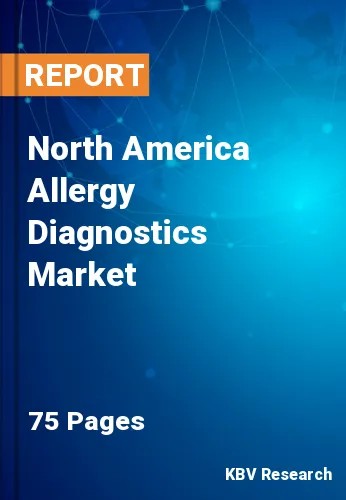The North America Allergy Diagnostics Market would witness market growth of 12.8% CAGR during the forecast period (2022-2028).
The utilization of mHealth for the diagnosis of allergic rhinitis (AR) is currently limited because so few mHealth tools have been reported in peer-reviewed publications. A new generation of point-of-care devices has been developed as a result of recent improvements in integrated biosensors, wireless connectivity, and power harvesting strategies. Intranasal biosensors and peak nasal inspiratory flow meters are only two examples of diagnostic devices that can be linked to smartphones.
An allergy monitor, for instance, helps to track symptoms and medicine dosage, which are then matched to local pollen concentrations. When an individual's immune system responds to allergens, which are natural compounds found in the environment, allergic reactions happen. Dust mite secretion, pollen, and pet dander are the three main allergens that have a negative impact on the immune system.
Food allergies can result in symptoms like rashes and digestive issues and are typically brought on by eating certain proteins contained in food. Itchy, bumpy, swollen, red, and scaly skin are just a few of the symptoms of skin allergies, which can also be brought on by medications, immune system issues, and infections. Allergies to dust are brought on by dust mites, pollen, pet hair, mold, and cockroaches.
According to a population-based cross-sectional prevalence study of over 50,000 households in the United States that was published in 2018, 1 in 10 adults and 1 in 12 children are likely to have IgE-mediated food allergies. These results together suggest that over 10% of the United States population is likely to have at least one IgE-mediated food allergy, and even more people report having a current food allergy even in the absence of symptoms that are IgE-mediated. For instance, over 11% of children had a parent-reported food allergy in this survey, and nearly 1 in every 5 adults (19%) reported having at least one current food allergy.
The US market dominated the North America Allergy Diagnostics Market by Country in 2021; thereby, achieving a market value of $3,072.9 million by 2028. The Canada market is experiencing a CAGR of 15.3% during (2022 - 2028). Additionally, The Mexico market would witness a CAGR of 14.3% during (2022 - 2028).
Based on End-user, the market is segmented into Diagnostic Laboratories, Academic Research Institutes, Hospital-based Laboratories, and Others. Based on Allergen, the market is segmented into Inhaled, Drug, Food, and Others. Based on Test Type, the market is segmented into In Vivo and In Vitro. Based on Product & Services, the market is segmented into Consumables, Instruments, and Services. Based on countries, the market is segmented into U.S., Mexico, Canada, and Rest of North America.
Free Valuable Insights: The Global Allergy Diagnostics Market is Estimated to reach $11.4 Billion by 2028, at a CAGR of 13.3%
The market research report covers the analysis of key stake holders of the market. Key companies profiled in the report include Danaher Corporation, Hitachi chemical Diagnostic Inc., Hycor Biomedical Inc., Lincoln Diagnostics Inc., Omega Diagnostic Llc, Siemens Healthcare Diagnostics, Inc., Thermo Fisher Scientific Inc., Neogen Corporation, Eurofins Scientific Group, and ACON Laboratories, Inc.
By End-user
By Allergen
By Test Type
By Product & Services
By Country
Our team of dedicated experts can provide you with attractive expansion opportunities for your business.

